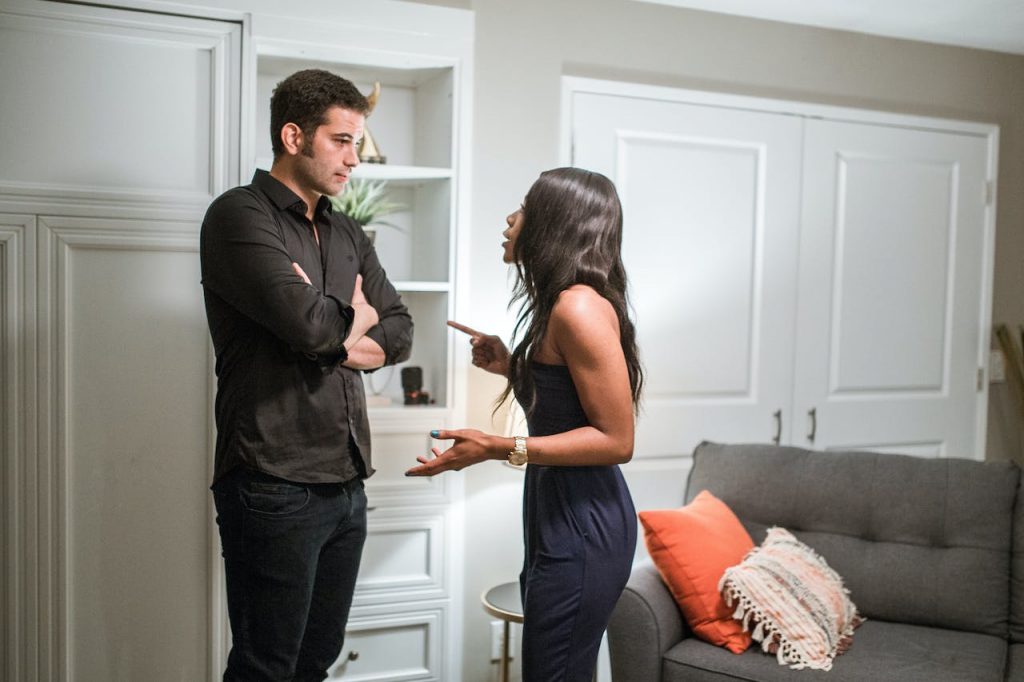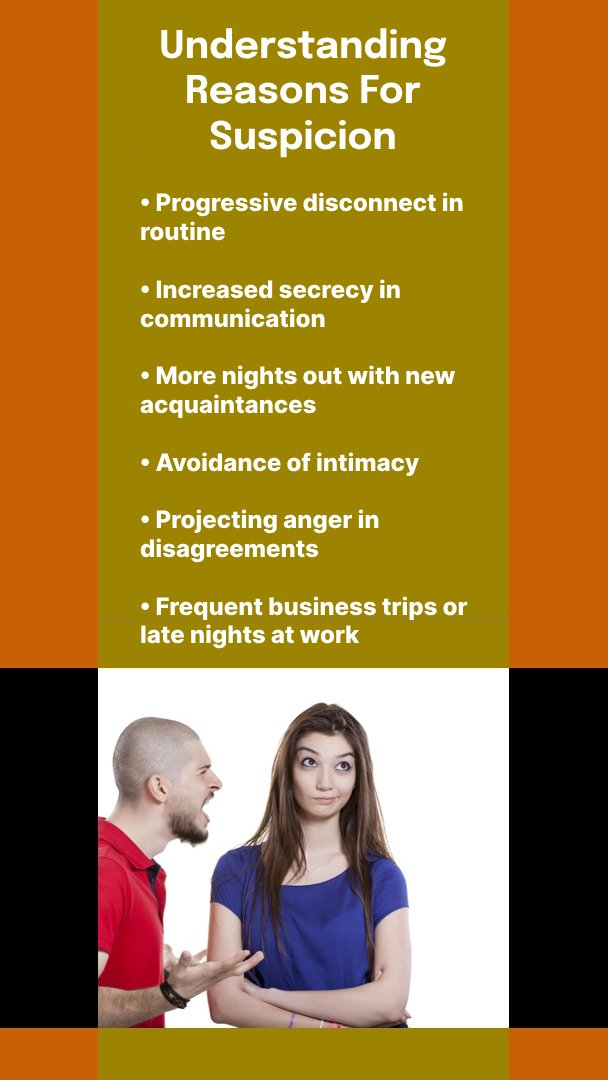“I think my wife cheated on me but I have no proof” -this persistent suspicion leaves me profoundly confused about our relationship’s future. Without definitive evidence, doubts corrode emotional intimacy foundations, preventing moving forward together or apart. However, constructive pathways exist to gain clarity and begin healing. This guide explores avenues for restoring communication channels damaged by perceived betrayals, even if confirmation remains elusive.
- Understanding Reasons For Suspicion
- I Suspect My Wife Is Cheating But I Have No Proof: How It Influences The Partner
- I Think My Wife Cheated On Me But I Have No Proof. How to Deal With This Issue?
- Gathering Evidence Of A Partner's Infidelity
- I Know She Cheated But She Won't Admit It
- How To Ask Your Wife If They Are Cheating
- Responding To Denials or Admissions Of Cheating
- Wife Denies Cheating: How to Confront Her?
- Having a Sincere talk May Be the Solution
- Conclusion
- Infographics
Understanding Reasons For Suspicion
When progressive disconnect shows in a wife’s routine – secrecy, absent affection, late nights – suspicions arise, predicting betrayal. Confronted, wife denies cheating. Small oddities get initially dismissed until a threshold triggers deeper uncertainty about fidelity breaches.
Common triggers sparking cheating suspicions without hard proof include:
- Increased secrecy around texts/phone messages – a partner taking calls privately, hiding their screen when texting or messaging, or being evasive about whom they’re communicating with can signal potential cheating.
- More nights out with friends – a dramatic uptick in evenings spent away from their significant other with new acquaintances or old friends can stir doubts about fidelity. It may indicate desires for freedom or pulling away emotionally.
- Avoidance of intimacy – emotional/physical distancing may redirect energies outside the partnership.
- Projecting anger in disagreements – wife denies cheating, gets defensive easily, or responds to issues in the relationship with uncharacteristic and frequent irritation or rage, may be deflecting guilt over their own transgressions.
- Frequent business trips/late nights at work – time devoted to jobs instead of relationships allows cheating opportunities. Partners often hide affairs behind careers.
However, confirming infidelity accusations without gathering more facts risks harming healthy relationships. Restoring open, non-judgmental communication about changes demonstrates care and mitigates damages more than rash assumptions do. While suspicions arise from intuited realities, compassionate discretion is key.
I Suspect My Wife Is Cheating But I Have No Proof: How It Influences The Partner

When serious infidelity doubts emerge in a marriage, it leads to a tumultuous emotional landscape for both partners. “I suspect my wife is cheating but I have no proof,” this thought alone can plunge one’s spouse into a storm of feelings: anger over the potential unfaithfulness, confusion about distinguishing reality from fear, and a deep sense of hopelessness about the future of the relationship. This turmoil is mirrored in the spouse, who, regardless of her actual guilt, may find herself battling a mix of resentment towards the accusations and profound grief over the erosion of intimacy in their relationship. Often, she may respond with adamant denials, further muddying the waters of truth.
The husband, overwhelmed by a whirlwind of doubt and vulnerability, might find himself hurling unfounded allegations, born more from his internal conflict than any concrete proof. This includes suspecting infidelity, such as reflection, “I think my wife cheated on me but I have no proof.” On the other hand, the wife, feeling wrongly blamed, may withdraw into a fortress of resentment. However, embracing honesty and clear dialogue could be the key to addressing and overcoming these challenges.
Restoring a relationship strained by infidelity suspicions requires vulnerability from both partners – a willingness to openly share feelings and observations non-judgmentally, take accountability for emotional damages inflicted, and acknowledge difficult truths.
I suspect my wife is cheating, but I have no proof – this doubt often arises from certain signs that raise doubts. Such as her growing secrecy, a noticeable decrease in affection, her often being unreachable, projecting anger without clear reasons, forming new social circles, and noticeable changes in her behavior. However, it’s crucial to explore harmless reasons for these changes before making accusations.
The path forward mandates rebuilding fractured foundations of understanding and trust through honest communication. If both partners prove unwilling to confront problems compassionately and reestablish intimacy, finding closure may necessitate parting ways.
I Think My Wife Cheated On Me But I Have No Proof. How to Deal With This Issue?
Thinking a wife’s cheating is different from having conformable facts. The wife denies cheating. Husbands sensing distance growing between them commonly imagine worst-case scenarios – she’s being infidelity. But springs of suspicion, while valid, often arise more from fear of losing connection than actual observed deceit.
What gets noticed is how she pulls away from conversing less, makes herself sexually or emotionally unavailable, or redirects blame during disputes about the relationship. Feeling taken for granted, husbands protest.
In an attempt to confirm suspicions of infidelity, partners often resort to monitoring activities – scrutinizing phone records, mileage, receipts, and social media interactions. This approach is typically driven by the desire to substantiate yet unconfirmed theories of a spouse’s cheating. However, the key to resolving these issues, particularly in figuring out how to get a wife to admit cheating, lies in reestablishing open lines of communication. This requires a foundation of compassionate honesty from both parties.
Gathering Evidence Of A Partner’s Infidelity

When unfaithfulness violations feel intuitively real, yet concrete proof remains lacking, it becomes tempting to turn to a detective digging for evidence to either confirm or deny infidelity. However, while technology offers many tools to aid the search for truth, utilizing them could cross serious ethical lines, violate privacy, and rupture the relationship further. Tread cautiously proceeding down this path, even if you feel justified to know reality.
Monitoring phone logs, accessing emails or social media profiles, employing GPS tracking tools, and setting up hidden cameras to detect infidelity all signal a catastrophic decline in trust, pushing the relationship to the brink of collapse. Even if such secret surveillance fails to uncover concrete evidence, the distrustful partner remains skeptical, and in cases where it does confirm infidelity, like when I know she cheated but she won’t admit it, the prospect of honest dialogue and reconciliation vanishes.
I Know She Cheated But She Won’t Admit It
The deepest emotional wounds between spouses occur when one becomes certain cheating transpired, yet the other adamantly denies it. Revelations derived from dishonest methods don’t facilitate reconciliation. Even trickle-truth confessions given begrudgingly after evidence is confronted still destroy foundations for positively moving forward together.
I know she cheated but she won’t admit it, and this forms the root of the deepest emotional wounds in a marriage. When one partner is certain of the other’s infidelity yet faces stubborn denial, the damage is profound. As bitterness grows from past faithlessness, hopes dim for a satisfying future together, causing the spouse to seek resolution outside the relationship.
How To Ask Your Wife If They Are Cheating
When suspecting infidelity, directly confronting your wife is often counterproductive and may not lead to a truthful admission, especially if you lack solid proof. Instead of accusing, focus on inquiring about noticeable shifts in the dynamics of your intimacy – such as changes in frequency, enthusiasm, and openness. Explain how these changes affect your emotional connection by expressing your feelings using “I feel…” statements rather than making “You are…” accusations. This approach fosters a non-threatening environment that encourages honesty. By seeking to understand and gradually rebuilding emotional closeness, you create an atmosphere more conducive to having an open discussion about potential infidelity. This method can be more effective in guiding you on how to get your wife to admit cheating if that is indeed the case.
Responding To Denials or Admissions Of Cheating
When addressing suspicions of infidelity, the situation is often charged with intense emotions like confusion, pain, anger, and betrayal. It’s crucial to approach the matter with a calm and composed mindset, avoiding impulsive accusations or decisions. How to get wife to admit cheating? Open, honest, and respectful communication is key. Encourage a safe space for dialogue where both parties can express their feelings without fear of judgment or retaliation. Remember, the goal isn’t just to elicit an admission but to understand the underlying issues and work toward healing and rebuilding trust if both partners are willing.
Wife Denies Cheating: How to Confront Her?

When directly confronted about potential infidelity, most partners initially deny accusations, as openness risks lost security. Admitting impropriety, to any degree, eliminates control in steering the relationship’s course going forward. Loss aversions trigger cover-ups.
If the wife denies credibly and makes efforts toward genuine transparency that help explain away suspicions, commit to resetting assumptions. Make it safe to gain understanding. However, if the wife seems deceptive, reserve sharing evidence sources. Calmly reiterate the desire for honesty about changes observed in the spouse’s intimacy patterns.
What to do if you think your spouse is cheating? Solid steps for coping with suspicions without absolute proof include avoiding fixation on assumed infidelity scenarios. Seek facts, observe changes, and gather proof ethically if possible. Confront with compassion, not accusations. With experts’ help, create opportunities for admitting past mistakes, repenting, forgiving, and reconciliation.
Know that sincere admissions followed by consistently changed behaviors offer the only hope for relationship mending. Even then, skepticism remains, and the path back to care and devotion proves to be long. But for willing partners, it’s not impossible.
Having a Sincere talk May Be the Solution
How to ask if your partner is cheating? When addressing the sensitive topic of potential infidelity with your relative, it’s important to approach the conversation with empathy and openness rather than accusation or confrontation. Begin by choosing a calm, private setting where you both spouses feel at ease and are unlikely to be interrupted. Start the discussion by sharing your feelings using “I” statements, such as “I’ve been feeling a bit anxious about our relationship lately,” to express your concerns without directly accusing your lover. Ask open-ended questions that encourage a two-way dialogue, like “Have you been feeling happy with us?” or “Is there anything on your mind about our relationship?” This approach fosters an environment of mutual respect and understanding.
Listen actively to your partner’s responses, maintaining eye contact and showing genuine interest in their feelings. Remember, the aim is to foster understanding and honesty, not to place blame or create conflict.
Conclusion
Left unrestrained, suspicions corrupt previously healthy foundations binding partners in purposeful relationships. But cheating, once revealed, forever changes how couples view their future potential together. What to do if you think your spouse is cheating? Ignore subtle speculation warnings, no longer. Restore communication, uncovering reasons behind the partner concerning behavioral changes or emotional distance. With compassion, guidance, honesty, and accountability, cheating sometimes gets overcome, and amends are made. For willing partners, trained experts optimize chances to clear speculation air, reconnect where emotional bonds weakened, and cautiously rebuild trusts destroyed. Not all survive infidelity tremors fully intact. Yet, many emerge stronger and more closely bonded for having navigated the unrest together.
Infographics
